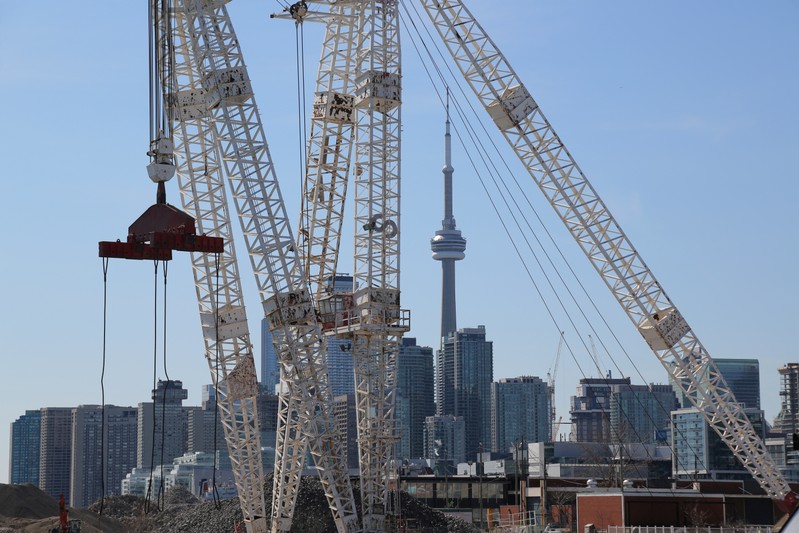
FILE PHOTO: The downtown skyline and CN Tower are seen past cranes in the waterfront area envisioned by Alphabet Inc’s Sidewalk Labs as a new technical hub in the Port Lands district of Toronto, Ontario, Canada March 29, 2019. REUTERS/Chris Helgren/File Photo
October 31, 2019
By Moira Warburton
TORONTO (Reuters) – Alphabet Inc’s Sidewalk Labs unit secured conditional approval to move forward in the process to build a smart city in Toronto after agreeing to develop a smaller area than initially proposed and make concessions on data collection and privacy, the city’s waterfront development board said on Thursday.
The directors of Waterfront Toronto met to consider “alignment on critical issues” between Waterfront and Sidewalk Labs on the company’s proposal to build a futuristic urban development project along Toronto’s water front.
The project will now go through a formal evaluation and further public consultation before a final vote on March 31, 2020 by Waterfront Toronto, a corporation funded by the city, provincial and federal governments.
Sidewalk agreed to decrease the initial development to 12 acres, after outlining a development of 190 acres in June. It also agreed to scrap a proposed “Urban Data Trust,” which many critics warned had the potential to compromise the privacy of individuals’ data.
Sidewalk had also wanted to be the sole developer of the area, but has now agreed to partner with “one or more real estate developers” that would be chosen through a “customary” competitive public procurement process led by Waterfront.
“While a final Board decision whether or not to proceed has yet to be made, we are pleased that we are now able to move to the evaluation stage,” Stephen Diamond, chair of the Waterfront Toronto board of directors, said in a statement.
The project proposes features such as a thermal grid to lower power use, traffic signals that use data to prioritize pedestrians who need more time to cross roads and a self-financing light rail transit connecting the Greater Toronto Area to the waterfront, among other features, according to a master plan released by Sidewalk Labs in June.
That plan also said the project will add C$14.2 billion ($10.8 billion) annually to Canada’s GDP, C$4.3 billion in tax revenue, and create 44,000 permanent jobs by 2040. Andrew Tumilty, spokesman for Waterfront Toronto, said the group does not yet have adjusted figures, adding that would be worked through in the formal evaluation process.
Waterfront Toronto has a mandate to approve projects, although some aspects – including sales of government land – would still have to be approved by the relevant level of government.
The project has faced hurdles. Critics said Sidewalk Labs’ proposals for data usage and storage took too much from individuals, and did not create enough opportunities for Canadian businesses.
Sidewalk and Waterfront Toronto had until Thursday to resolve “threshold issues,” as Waterfront termed them, including data usage and scope of the project, that would satisfy both parties and allowed the project to move forward toward final approval.
Sidewalk Labs said in a letter to Waterfront Toronto CEO George Zegarac that they “look forward to continuing our collaboration” but the change would affect the “innovation agenda and economic underpinnings of our proposal.”
The citizens’ group #BlockSidewalk said in a press release that they consider the updated agreement “a step in the right direction,” but a “missed opportunity to finally rid ourselves of a company that is not a trustworthy partner for Toronto or any other city.”
(Reporting by Moira Warburton; Editing by Denny Thomas and David Gregorio)
